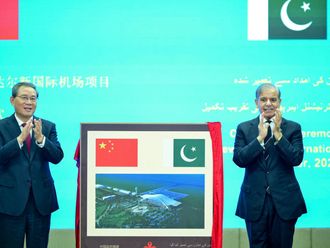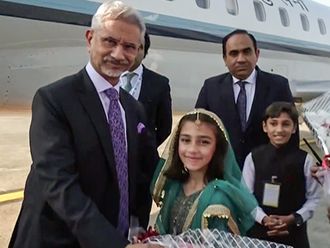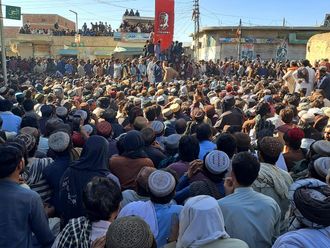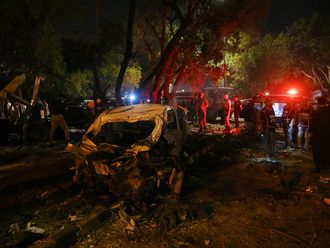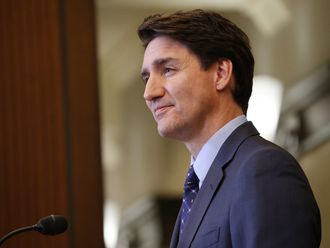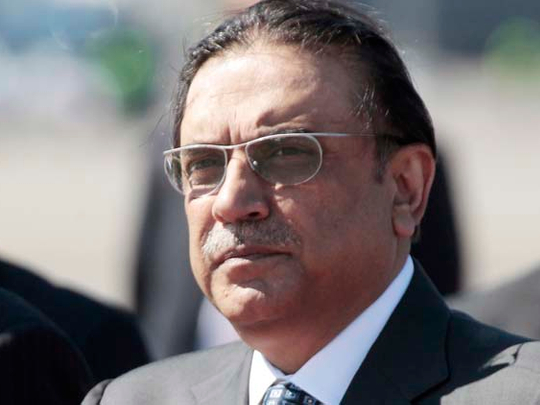
Islamabad: Tension between Pakistan's civilian government and military has plunged the country into crisis but military sources ruled out a coup on Thursday as President Asif Ali Zardari's departure for Dubai raised questions about his future.
An aide said that Zardari was in Dubai for a brief visit on Thursday, possibly for a health check. The Pakistani president has reportedly left the city in the UAE.
Meanwhile, the prime minister has called a meeting of the cabinet's defence committee for Saturday and the army chief will attend, a government official said, in a possible sign of efforts to reduce friction in the nuclear-armed country.
A disputed memo allegedly from Zardari's government seeking US help in reining in the military has soured relations to their lowest point since a coup in 1999.
Competition for power between civilian politicians and the military has defined Pakistani politics since the country's formation in 1947. The military has seized power three times and ruled for about half the time since independence.
Earlier on Thursday, a meeting between army chief General Ashfaq Kayani and his top commanders fueled speculation that the generals, who set security and foreign policies, had lost patience with the government.
Senior officers discussed in detail "prevailing conditions", a source told Reuters, highlighting fears for the economic and political stability of Pakistan, a vital but uneasy ally for the United States in its attempt to fight militancy and bring peace to neighbouring Afghanistan.
Military sources say that while they would like Zardari to go, it should be through constitutional means, not another of the coups that have marked half of Pakistan's almost 65 years of independence.
"There is no talk in the military of a takeover," a mid-level army officer, who requested anonymity because he was not authorised to speak on the matter, told Reuters. "I don't foresee a military coup."
The next election is due in 2013 when the military will no doubt be hoping Zardari's Pakistan People's Party (PPP) will be defeated. Legislators will elect a new president, which is a largely ceremonial post, after the general election.
The PPP, founded by Zardari's father in law, Zulfikar Ali Bhutto, and later led by his late wife, Benazir Bhutto, has long opposed military involvement in politics.
The military on Wednesday warned of "grievous consequences" after Prime Minister Yusuf Raza Gilani of the PPP accused the army and spy chiefs of violating the constitution in what has become known as "memogate".
The remarks came after Gilani, citing "gross misconduct" sacked the defence secretary, a post seen usually as the military's main advocate in the civilian bureaucracy.
Zardari went to Dubai for medical treatment last month, triggering speculation that a coup was imminent. He returned home a couple of weeks later and has remained defiant.
Gulf-based Pakistani sources said Zardari's Thursday trip to Dubai, where he maintains a home, was for a medical check-up. However, a senior PPP member said Zardari was in Dubai to attend a wedding.
No official explanation was given, fuelling uncertainty about the president's fate, although the Foreign Ministry later said he was due back on Friday from a private visit. The Supreme Court has also threatened the government with contempt proceedings that could lead to the fall of senior officials including the prime minister if it does not take action on long-standing corruption cases against Zardari.
Familiar fight
Pakistanis, tired of struggles between civilian and military leaders, want the government to focus on issues such as crippling power cuts, the fragile economy and poverty. "There is complete chaos.
However, But our institutions are busy bringing each other down," said Syed Ali, 23, an engineering student in the city of Lahore. "They should stop all this and do their jobs."
Newspaper editorials were grim, predicting a showdown between the government and a military that is so powerful it sets security and foreign policies.
"The army is facing a critical situation; it does not want a takeover - and it should not - but it is facing insults from the highest political level," said The News in an editorial titled "Wrong turn".
A senior member of the PPP also warned on Wednesday that both sides appeared to be digging in their heels, although others have played down talk of an imminent showdown. The military drew rare public criticism after Al Qaida head Osama Bin Laden was killed in a unilateral cross-border raid by US special forces troops in a garrison town not far from the Pakistani capital last May.
The memo scandal emerged several months later when a Pakistani-born businessman wrote in a column in the Financial Times about the existence of a memo seeking help from the Pentagon to rein in Pakistan's military.
Businessman Mansoor Ijaz said a Pakistani diplomat had asked for the memo to be delivered to the Pentagon. He later identified the diplomat as Husain Haqqani, a Zardari ally who was then Pakistan's ambassador in Washington.
Haqqani has denied the allegation but has since resigned in a bid to end the scandal, which has resulted in a judicial commission in the Supreme Court. Zardari could face impeachment proceedings if that commission finds a link between him and the memo.
Zardari was elected in 2008 on the back of a sympathy vote after his charismatic wife, former prime minister Benazir Bhutto, was assassinated shortly after returning from self-exile late the previous year.
Criminal cases could also haunt Zardari, who earned the title "Mr. 10 Per cent" while Bhutto was in power, based on allegations he demanded kickbacks on state contracts. After his wife's government was brought down in late 1996, he was arrested and charged with corruption, such as kickbacks in deals involving a Swiss company.
He was never convicted, but spent the next eight years in jail. Zardari was also jailed on corruption charges between 1990-93. He has denied any wrongdoing and says allegations leveled against him are politically motivated.


